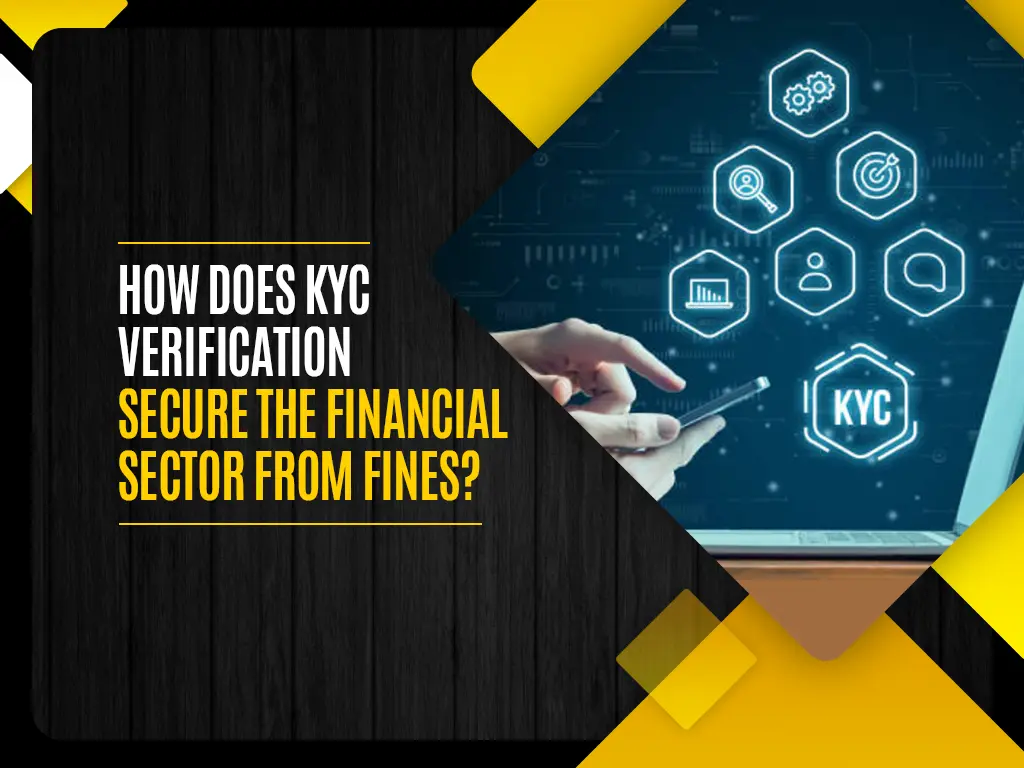How Does KYC Verification Secure the Financial Sector from Fines?

Online KYC secures your finances and are a go-to method for financial institutions. And there is a reason why. The banking industry is crowded with imposters who take shortcuts to profit quickly. That’s why the majority of clients now prefer digital channels. Hence, organizations should use different verification methods to restrict the rise of online crimes and digital fraud. Document theft transpires as scammers use similar tools to make security systems. Hence, they use these services for their own benefit by reverse engineering them.
Insurance companies and banks are preliminary targets for scammers as they regularly interact with them. That’s why it is crucial to restrict these imposters as soon as possible to secure the information of credible users. Service providers provide sophisticated KYC processes to keep the banking system safe. It helps deter criminals and simplify business operations.
Online KYC Verification in the Banking Industry
Know Your Customer (KYC) techniques are more common in banking and finance. Moreover, KYC compliance comprises all those rules and ordinances when users connect with a business. Hence, it makes banking secure for clients and prevents criminal activity.
The AML/KYC compliance for banks simplifies the user onboarding procedure and assists in noticing suspicious behavior. Knowing your customer’s paperwork aids users in avoiding monetary scams. Money laundering, tax evasion, drugs illegal export or import, and terrorist financing are all examples of fraud.
Furthermore, maintaining stringent security measures and validating identities is critical across various sectors, not just in banking. For instance, ensuring the identification of individuals in correctional facilities is vital for maintaining legal standards and safety. This approach is akin to verifying a customer’s identity in financial institutions, underscoring the universal importance of secure and reliable verification processes. In the context of financial crimes, utilizing inmate locators can also serve as a critical tool. By verifying whether individuals have been involved in financial scams, institutions can further safeguard their operations against fraud and enhance overall security measures.
Firms should present regulatory compliance by sticking to KYC criteria during user onboarding. Moreover, it allows firms to stay compliant by avoiding heavy fines for not doing so. Ultimately, doing so improves credibility in the view of clients and service providers.
Digging Deeper into the KYC Verification
Online KYC verification is the method that financial organizations, such as banks and FinTech companies, adhere to certify client uniqueness. As a result, online KYC verification helps firms avoid significant fines by meeting regulatory requirements. The specific information and documentation requested by financial firms depend upon elements such as the geographical area and risk associated with the client.
Hence, the underlying aim of KYC is to remain continuous throughout the process, and that is as follows:
- To eradicate any illegal activities
- To authenticate the consumer’s intentions
What are the Advantages of Online KYC Verification?
Insurance companies, trading platforms, banks, and non-banking monetary organizations rely on KYC compliance check conditions. Account takeovers, unlawful transactions, and Illegal fake identities are now addressed, as it is a form of financial crime.
-
A Powerful Brand Image
Any firm integrating the KYC compliance procedure into its client onboarding procedure follows the advanced banking service provider rules. Also, this aids in building the company’s brand image and credibility by attracting positive user attention and establishing a vital base for a loyal customer.
-
Streamlined User Onboarding through the KYC Process
Firms have a better chance of reducing cybercrime at the time of startups. Moreover, KYC verification guarantees the client legitimacy by making a purchase and helps reduce the identity theft risk for clients. Also, the prior eradication of unethical firms reduces cyber crimes and fake identities. Online KYC verification allows businesses to gather and keep clients’ precise, privately identifying details for future verification.
-
Combat Financial Crime with Online KYC
Only credible clients can make their profiles and open private accounts with the help of online KYC regulations. It’s a secret, easy, and secure technique to bring new clients on board. It’s a possible solution to control illicit funds transfers and cryptocurrencies. Due to this, many companies invest in developing inventive KYC frameworks. Online KYC secures you from financial crime.
Online KYC Verification: The Only Way Forward
The rising number of cybercrimes has left numerous methods obsolete. Therefore, financial firms face more challenges in securing the financial system. They must also create solutions that significantly enhance client and market security.
Few digital methods are there that ensure online KYC compliance that gained popularity. These techniques usually use biometric verification to validate individuals in real time, such as document verification, facial recognition, and fingerprint scanning.
Final Thoughts
There is discontentment over the rigid requirements for a few banking transactions. Therefore, denying these rules and compliances exist for the good is impossible. Avoiding KYC verification in the current age is to invite fraud knowingly. Additionally, there is an extreme possibility of a data breach leading to penalties and other punishments. Clients and service providers have benefited from the speed and ease of online KYC verification. Moreover, enhancing accuracy and making information available in real time also minimizes the requirement for human checks. Online KYC secures your investments and prevent you from frauds. Hence, it is mandatory.
Now you can integrate online verification document to add that extra layer of security. Curious to know how? Here’s how you do it.

